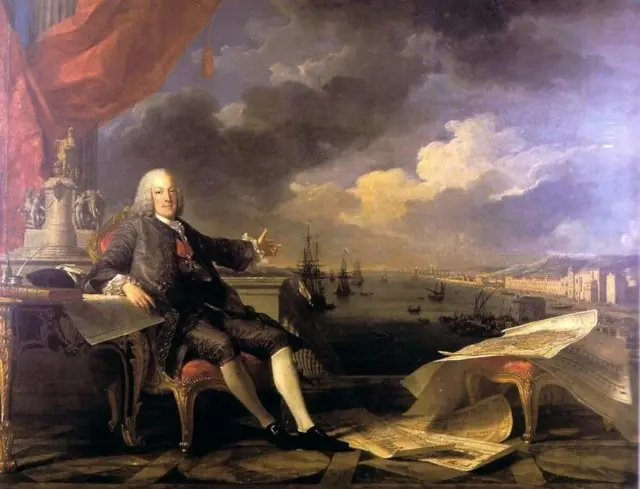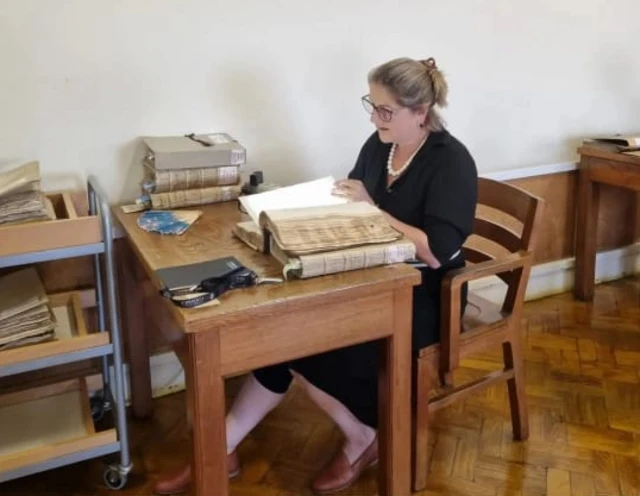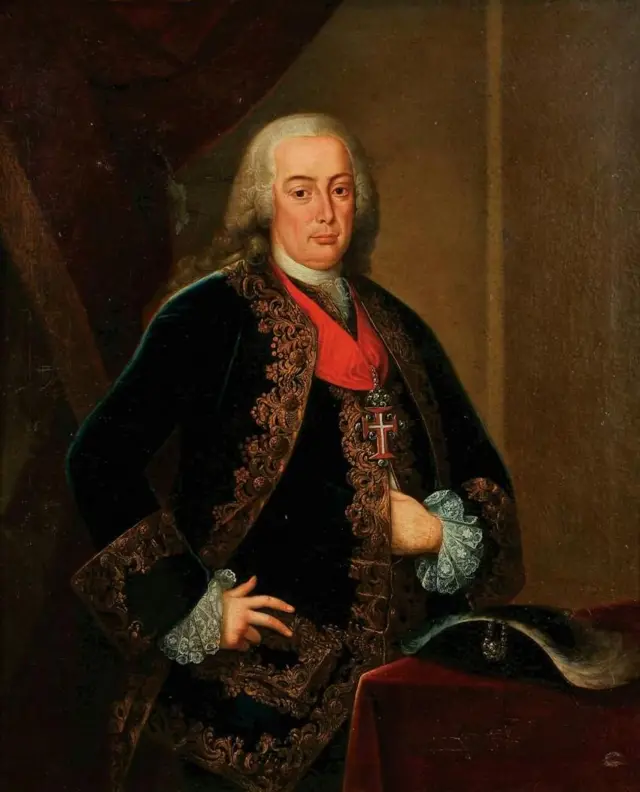O que 'nova' biografia de Marquês de Pombal revela sobre uma das figuras mais controversas da História do Brasil

- Edison Veiga
- De Bled (Eslovênia) para a BBC News Brasil
Figura de destaque nos livros de História do Brasil, o diplomata e estadista Sebastião José de Carvalho e Melo (1699-1782), conhecido como Marquês de Pombal, deixou marcas no território brasileiro que acabaram moldando a organização do país independente que haveria de se formar.
Marquês de Pombal foi secretário de Estado do reino português entre 1750 e 1777, durante o reinado de dom José 1º (1714-1777).
Ele era adepto do "despotismo esclarecido", a combinação de princípios da monarquia absolutista com o racionalismo iluminista.
Nessa linha, monarcas e seus homens de confiança implementaram reformas como limitações ao poder da Igreja Católica, desenvolvimento de indústrias e aprimoramento do sistema judiciário, mas mantiveram o controle sobre a sociedade, adaptando as ideias iluministas às suas necessidades.
Apesar de controversa, sua gestão com mãos de ferro foi marcante e imprimiu mudanças indeléveis na sociedade lusitana e brasileira — apesar de ele nunca ter pisado no Brasil.
Pombal colecionava admiradores e detratores.
Um de seus grandes críticos contemporâneos, o cardeal dom José Francisco António de Mendonça (1725-1808), patriarca de Lisboa, chegou ao ponto de escrever uma minuciosa biografia — possivelmente a primeira escrita sobre Pombal — feita para circular apenas em um grupo restrito.
Tudo indica que ela foi escrita entre 1777 e 1786.
Fim do Mais lidas
Fim do Whatsapp!
Descoberta por dois pesquisadores brasileiros, uma das versões do inédito manuscrito estava guardada na clausura do Mosteiro de São Bento de Salvador.
O texto foi analisado, ganhou referências contextuais e agora saiu em livro: Primeira Biografia do Marquês de Pombal (Bertrand, 2025).
Tudo indica que o autor da biografia não visava à publicação.
"O documento não circulou na época porque visivelmente não foi feito para ser publicado, mas para ir para as mãos exatas. Era um relatório com feitos e fatos com um tom pesadamente negativo em alguns pontos", comenta a paleógrafa Alícia Duhá Lose, professora na Universidade Federal da Bahia (UFBA) e coordenadora do projeto e do livro.
"Era para ser entregue nas mãos da rainha, do príncipe, dos dirigentes da época, para fazer o linchamento público da imagem do Pombal."
O fato de a obra ter sido escrita pelo patriarca de Lisboa, dom Mendonça, é um fato importante, ressalta Lose: "Não foi escrito por um 'zé ninguém', mas por alguém de grande influência, uma pessoa muito ouvida nas instâncias de poder de Portugal."
O manuscrito com a biografia de Pombal inicialmente pertencia a uma coleção particular no Rio de Janeiro e foi doado pelo então proprietário ao Mosteiro de São Bento de Salvador.
Segundo os pesquisadores, a intenção era que o material fosse melhor guardado e estudado.
Mas o manuscrito ficou arquivado sem que ninguém atentasse para seu valor histórico — até que, em 2010, um princípio de incêndio causado por um desumidificador de ar danificou algumas obras raras.
Especialistas em livros antigos foram chamados para analisar o estrago e trabalharem na recuperação.
Foi quando Lose e o filólogo Rafael Magalhães se depararam com o manuscrito, rubricado apenas como "códice 132", sem título ou autoria.
O material foi pesquisado por Magalhães na iniciação científica, no mestrado e no doutorado. Ao longo dos anos, foram descobertos a autoria, o ineditismo e a relevância histórica do material — além de obras-irmãs.
Lose conta que a Universidade de Coimbra, em Portugal, tem outra versão do documento — "suja", ou seja, com emendas, observações e rasuras, como se fosse o rascunho da versão definitiva.
A Brasiliana, coleção que era do bibliófilo José Mindlin (1914-2010) e hoje fica na Universidade de São Paulo (USP), tem outra cópia, um pouco mais avançada.
E o manuscrito encontrado no Mosteiro de São Bento foi avaliado, pelos pesquisadores, como a obra finalizada.
Nos dez anos de pesquisa, descobriu-se que o texto não foi redigido por uma só pessoa. Muito provavelmente, como era comum naquela época, o cardeal português incumbiu uma equipe de redigir o material, sob sua supervisão.
Lose explica que é possível identificar a "mão da autoridade" — uma caligrafia menos apurada esteticamente mas que sinaliza, na versão primária, as alterações que depois são seguidas nas versões seguintes. Seria a caneta de dom Mendonça.
O historiador Paulo Henrique Martinez, professor na Universidade Estadual Paulista (Unesp), comenta que a descoberta, agora publicada em livro, "enriquece o conhecimento e pode elucidar questões pontuais" a respeito de Pombal e do período em que ele esteve no poder.
Martinez não fez parte da equipe responsável pelo livro.
"Chama a atenção para a importância da preservação da documentação histórica e para o incentivo à pesquisa em arquivos brasileiros e portugueses", comenta, acrescentando que as políticas públicas para arquivos e documentação estão "defasadas e sucateadas" no Brasil.
Mais do que curiosidades históricas — como o fato de que, até então, não se sabia o local de nascimento de Pombal, que segundo o livro foi em Sernancelhe, no Douro, em uma família de posses —, a biografia detalha o papel do então secretário de Estado em um momento importante para a Coroa portuguesa e para a formação do Brasil.
Pombal implementou medidas que racionalizaram a administração colonial, transferiu a capital de Salvador para o Rio, criou um departamento real para tratar a questão indígena e determinou a obrigatoriedade do uso do português na vida cotidiana da colônia.
Ao fim do reinado de Dom José 1º, ele passou a acumular tanto poder que muitos o definem, nesta fase, como ditador.
Oponentes do regime passaram a ser perseguidos e presos no Forte de São João da Junqueira, nos arredores de Lisboa.
Quando o rei morreu, em 1777, e assumiu o trono sua herdeira Dona Maria 1º (1734-1816), a Coroa mudou de rumo, instituindo a política que ficaria conhecida como "viradeira": uma verdadeira gestão antipombalina.
Os detratores do Marquês foram soltos e ele acabou se tornando uma carta fora do baralho da nova administração. A nova rainha decidiu abrir um inquérito contra Pombal, acusando-o de abuso de poder, enriquecimento ilícito e diversas outras ilegalidades.
Ele acabou condenado a "castigos corporais" — mas a rainha, por clemência, decidiu comutar a pena para "desterro perpétuo", obrigando-o a ficar longe da corte.
No ostracismo, Pombal passaria o fim da vida na sua propriedade, na província da Beira Litoral.
Mas Martinez destaca que o legado do marquês ultrapassou esta derrocada.
"A política pombalina, que sobreviveu à queda política do próprio Pombal, buscou assegurar a sobrevivência do reino e da monarquia em Portugal, diante da crescente agressividade de potências como França e a Inglaterra", afirma o historiador.

Luiz Eduardo Oliveira, coordenador da cátedra Marquês de Pombal na Universidade Federal de Sergipe (UFS), chama a atenção também para a "influência decisiva" do português no que "viria a ser o Estado brasileiro".
"Ele foi o primeiro a projetar a colônia como um espaço único, homogêneo e rentável, antecipando em parte o que depois seria a estrutura do Estado imperial brasileiro."
Ao mesmo tempo, a gestão de Pombal tornou a sociedade colonial no Brasil "mais lusitana", diz Martinez — por exemplo, com a expansão de órgãos administrativos e da presença militar, além de pesquisas, já baseadas na ciência moderna, sobre as potencialidades do território e da força de trabalho.
"Novas áreas de expansão foram abertas, como a lavoura canavieira em São Paulo, posteriormente sucedida pela cafeicultura", ressalta.
Para o pesquisador Paulo Rezzutti, autor de diversos livros de História do Brasil, a marca de Pombal foi impor uma "centralização do poder" que perdura até hoje.
"Na contemporaneidade você tem mais ou menos isso como legado: o governo federal influencia as demais partes da federação, os Estados federados que compõem o Brasil".
Outra semelhança com os tempos atuais é a "polarização" causada por Pombal, segundo os pesquisadores que descobriram o manuscrito.
"Uma das principais descobertas que fiz [durante meus estudos] é que, se uma pessoa procurar bem, encontrará alguém que falará exatamente o oposto daquilo que essa pessoa sabe ou acredita saber sobre Pombal", afirma Magalhães.
Afinal, o que o Marquês de Pombal fez para ser tão controverso?
'Quinto dos infernos'

Magalhães aponta que as "reformas pombalinas" buscaram otimizar a máquina estatal portuguesa — e, para o Brasil, isso significava ter que ser uma colônia mais produtiva em benefício da Coroa.
"Isso implicava necessariamente ir contra os interesses de quem estava se beneficiando com o estado anterior das coisas. E essa é uma das principais causas de divisões entre adoradores e detratores de Pombal", explica o filólogo.
Uma das mudanças lideradas pelo Marquês de Pombal foi a transferência da capital da colônia para o Rio de Janeiro, oficializada em 1763.
Essa decisão, no futuro, contribuiria para o protagonismo econômico da região brasileira que viria a ser conhecida como Sudeste.
Martinez explica que a transferência foi implementada em um contexto em que a mineração crescia em importância econômica — e, com isso, a necessidade de maior controle militar, combate ao contrabando e fiscalização para arrecadação de impostos.
"Daí a abertura de novas estradas, trajetos obrigatórios e postos de vigilância nas vias de acesso e de circulação no interior de Minas Gerais, São Paulo e Rio de Janeiro", exemplifica.
Rezzutti ratifica a importância do Rio nesse contexto.
"Colocar a administração no Rio fortalecia o estabelecimento de cidades e povoações mais ao sul, justamente a área de conflito maior com a fronteira com a América Espanhola", pontua o pesquisador.
"Também facilitava escoar a principal riqueza do Brasil, na época, que era o ouro e as pedras preciosas, ao levar a administração do Brasil para próximo dessa riqueza."
A arrecadação de impostos também foi aprimorada.
Antes de circular, o ouro minerado precisava passar por um reconhecimento governamental. Então, ele era fundido e 20% do total — um quinto — já acabava automaticamente retido com a cobrança de impostos.
Era o chamado "quinto dos infernos", na expressão popular.
A cobrança da taxa fiscal já existia desde o século 16, mas a logística se tornou mais eficiente na segunda metade do século 18 — tudo para evitar sonegação e contrabandos.
"Pombal não criou o sistema, mas ele reforçou", ressalta Rezzutti.
Segundo Martinez, o controle da circulação de mercadores, pessoas, traficantes de escravos, roceiros e artesãos completavam "o cerco" ao contrabando de minérios.
Repressão a línguas indígenas
Outra decisão bombástica de Pombal foi expulsar a Companhia de Jesus, a ordem dos jesuítas, do reino português.
A justificativa tinha como pano de fundo a ideia iluminista de separação entre Igreja e Estado, mas, na prática, também havia o objetivo de diminuir o poder dos católicos na colônia.
No início da colonização, esses religiosos tiveram papel preponderante.
Missionários desde a primeira leva, os jesuítasdominavam idiomas indígenas e acabaram controlando o trato europeu junto a estes povos.
A pretexto de catequese e uma suposta proteção, acabaram tendo a tutela inclusive sobre a mão de obra dessas pessoas.
Com a expulsão dos jesuítas, Pombal criou o chamado Diretório dos Índios, para suprir essa lacuna.
O órgão promoveu o incentivo ao comércio entre nativos e colonos, além do casamento entre indígenas e brancos.
Esse tipo de "integração", muitas vezes forçada, acabou contribuindo para o extermínio de alguns povos e culturas.
"Com isso, as terras indígenas passaram a ser mais facilmente adentradas pelos brancos", explica Rezzutti.
"De certa forma, esse cenário criado por Pombal vai desaguar nos problemas que temos hoje com questões de terras indígenas."
A escravização dos indígenas também passou a ser proibida.
"Essa integração tem um verniz iluminista: era algo como 'civilizar o selvagem'. Ao mesmo tempo, tirava-se da mão dos fazendeiros os escravizados indígenas", diz Rezzutti.
"Esses indígenas vão trabalhar para o Estado português, como assalariados, mas não deixavam de ter de trabalhar para o europeu. Eles serão mão de obra essencial para a retirada dos produtos coloniais levados para a Europa."
Oliveira pontua que, com o discurso de "civilizar" e "integrar" os povos indígenas, o Diretório dos Índios acabou suprimindo as estruturas comunitárias dos povos nativos.
"O casamento misto foi estimulado como forma de 'miscigenação civilizadora', mas acabou resultando em etnocídio e na destruição de muitos povos, pois os brancos passaram a habitar as antigas aldeias, agora alçadas a vilas", diz o professor.
"O Diretório revela um paradoxo pombalino: um discurso iluminista de 'inclusão' mascarando uma prática colonial de dominação."
Na mesma toada de fortalecer o controle português, Pombal proibiu o uso de línguas indígenas na colônia.
Na época, a chamada língua geral, uma evolução do tupi antigo, era a mais praticada no território.
Essa medida acabou fazendo com que o Brasil deixasse de ser, ao menos na esfera oficial, um país multilíngue — o que levou ao desaparecimento de centenas de idiomas nativos.

Filólogos contemporâneos acreditam que havia mais de mil línguas faladas no território há 500 anos — hoje, restam menos de 200.
A expulsão dos jesuítas teve como efeito colateral uma lacuna educacional — nas palavras de Rezzutti, houve "descontinuidade na educação", já que os colégios que havia então eram mantidos pelos religiosos da Companhia de Jesus e foram desativados em 1759.
Alguns deles voltaram a funcionar a partir do século seguinte — os primeiros jesuítas a retornarem ao Brasil chegaram em 1841.
No mesmo ano que Pombal determinou a expulsão dos jesuítas no Reino, a Coroa criou um instrumento chamado Aulas Régias. Foi o primeiro modelo a sistematizar um ensino laico em Portugal — e, por extensão, em suas colônias.
Em 1759, foi nomeado um diretor de estudos na Bahia, mas os primeiros concursos para professores só ocorreram em 1760 no Rio de Janeiro e no Recife. A primeira nomeação, apenas cinco anos mais tarde.
Ao trocar a roda do carro de bois com o veículo em movimento, foi inevitável que houvesse uma lacuna sem aulas formais na colônia. Além disso, o sistema de ensino capilarizado outrora comandado pelos religiosos se perdeu.
Mesmo diante de uma figura histórica que trouxe tantos impactos para o Brasil e para Portugal, Martinez afirma que as pesquisas contemporâneas têm acalmado os ânimos nas opiniões sobre Pombal.
"O desenvolvimento da pesquisa histórica, o debate e o conhecimento apurado da época, do Estado colonial e da monarquia portuguesa têm ampliado as perspectivas de análise e de interpretação dos significados do pombalismo e da figura do próprio Pombal. Há menos maniqueísmo e menor monocausalidade nos argumentos históricos."
